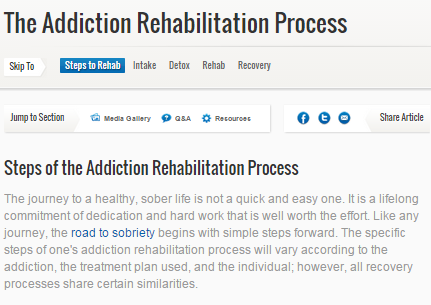There is no one-size-fits-all solution to drug treatment. Different treatments work for different people, and often when a person is not able to own up to his or her addiction, a loved one usually intervenes. Rehab does not have to be voluntarily; many addicts are compelled, in fact, to enter rehab by the court system or because of family and friends. Many in these cases do achieve recovery.
More evidences are showing that addiction isn’t a choice subject to willpower, but a brain disease that is chronic until treated. Many medical centers are recognizing that, as a disease, addiction can best be treated in a regulated and reputable St Louis rehab based on the medical model. Often, this means that a qualified doctor determines the seriousness of the addiction, as well as any existing co-occurring psychological disorders. The latter is just as significant for the facts given in this excerpt below, as outline in Rehabs.com:

Mental disorders are often linked to drug addiction and should be addressed in treatment
Effective treatment should address all areas of the addict’s life, not just the abuse or addiction.
Everyone should have easy access to treatment when they need it. Addiction affects the way the brain works
Medicinal treatment is often necessary and should be used in conjunction with therapy.
Medicinal treatment is necessary in some cases, particularly where the addiction is to opiates and heroin. This is administered in conjunction with other treatment approaches, such as behavioral therapy where triggering cues are recognized and then taught how to interrupt them. The motivational method, on the other hand, addresses psychological disorders that encourage patients to get on board with their treatment. Psychopharmacology outlines the prescriptions required for the condition of the patient.
There are varied treatment modalities, but for most of rehab centers, the pattern for the stages of recovery follow the familiar thread that includes withdrawal or detox, inpatient and outpatient treatment, rehabilitation, and aftercare.
An inpatient treatment program will first try to remove addicts from the old haunts and the old pattern of thinking and behaving by changing their environment under a medically supervised treatment facility. This also helps remove from them any temptation to relapse during any stage of the recovery plan. In the early stages, family members are restricted from visiting to limit distractions from the outside world. Residential drug rehab may last anywhere from three weeks to six months.
An outpatient rehab in St Louis as in many other outpatient treatment centers, is designed for those with short-lived addictions or those who have moved from inpatient treatment and have learned to maintain their general sobriety. These people are allowed to resume lighter duties in their home or work life as long as these places do not distract them from their recovery. Treatment therapies are still made available, including counselling and education.
(Sources: Steps of the Addiction Rehabilitation Process, rehabs.com )










